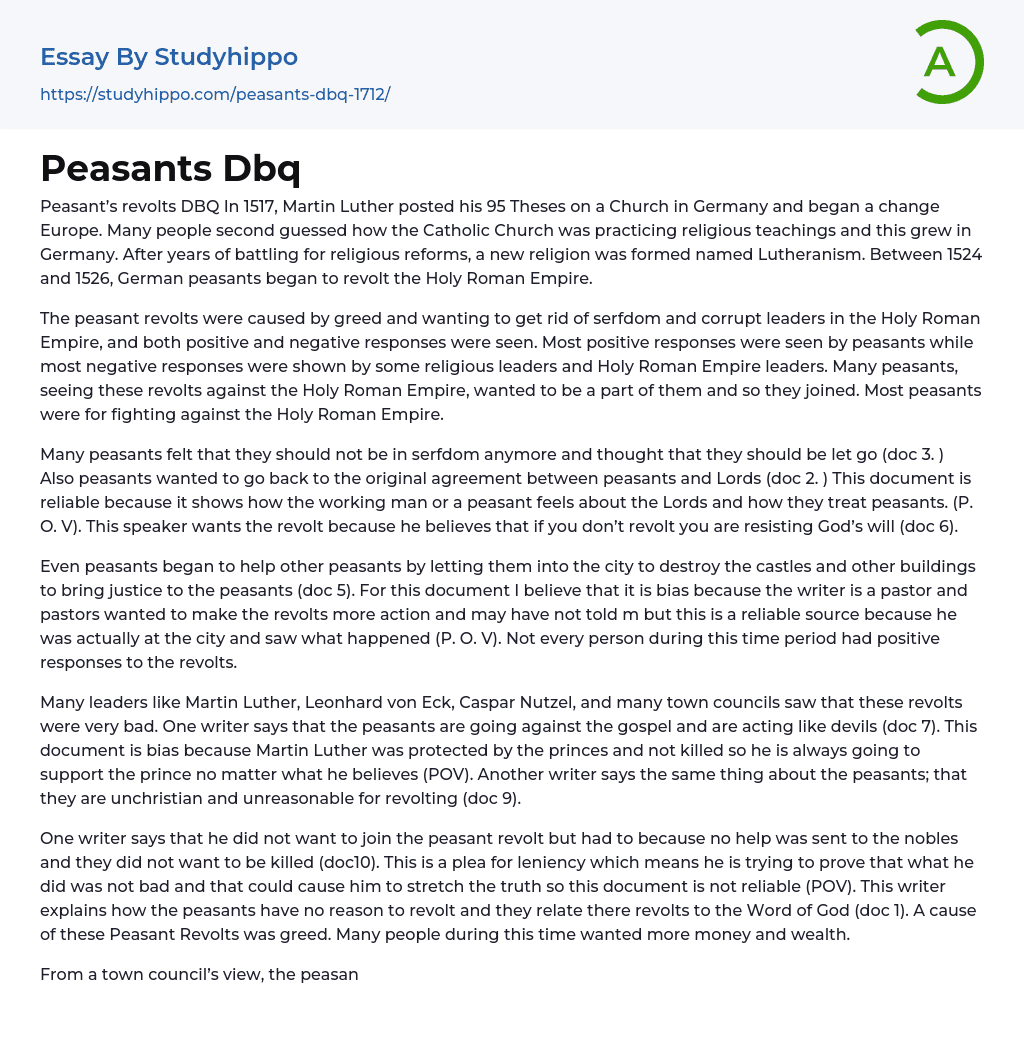Peasant’s revolts DBQ In 1517, Martin Luther posted his 95 Theses on a Church in Germany and began a change Europe. Many people second guessed how the Catholic Church was practicing religious teachings and this grew in Germany. After years of battling for religious reforms, a new religion was formed named Lutheranism. Between 1524 and 1526, German peasants began to revolt the Holy Roman Empire.
The peasant revolts were caused by greed and wanting to get rid of serfdom and corrupt leaders in the Holy Roman Empire, and both positive and negative responses were seen. Most positive responses were seen by peasants while most negative responses were shown by some religious leaders and Holy Roman Empire leaders. Many peasants, seeing these revolts against the Holy Roman Empire, wanted to be a par
...t of them and so they joined. Most peasants were for fighting against the Holy Roman Empire.
Many peasants felt that they should not be in serfdom anymore and thought that they should be let go (doc 3. ) Also peasants wanted to go back to the original agreement between peasants and Lords (doc 2. ) This document is reliable because it shows how the working man or a peasant feels about the Lords and how they treat peasants. (P. O. V). This speaker wants the revolt because he believes that if you don’t revolt you are resisting God’s will (doc 6).
Even peasants began to help other peasants by letting them into the city to destroy the castles and other buildings to bring justice to the peasants (doc 5). For this document I believe that it is bias because the writer is a pastor and pastor
wanted to make the revolts more action and may have not told m but this is a reliable source because he was actually at the city and saw what happened (P. O. V). Not every person during this time period had positive responses to the revolts.
Many leaders like Martin Luther, Leonhard von Eck, Caspar Nutzel, and many town councils saw that these revolts were very bad. One writer says that the peasants are going against the gospel and are acting like devils (doc 7). This document is bias because Martin Luther was protected by the princes and not killed so he is always going to support the prince no matter what he believes (POV). Another writer says the same thing about the peasants; that they are unchristian and unreasonable for revolting (doc 9).
One writer says that he did not want to join the peasant revolt but had to because no help was sent to the nobles and they did not want to be killed (doc10). This is a plea for leniency which means he is trying to prove that what he did was not bad and that could cause him to stretch the truth so this document is not reliable (POV). This writer explains how the peasants have no reason to revolt and they relate there revolts to the Word of God (doc 1). A cause of these Peasant Revolts was greed. Many people during this time wanted more money and wealth.
From a town council’s view, the peasants were asking freedom from serfdom but they did not want to give it to them because serfdom earned the town council money; however, they did say that
if they wanted to be free, they had to pay a reasonable amount of money which most likely was a lot of money (doc 4). This document is reliable because it is a reply from the town council which most likely shows that they are higher than peasants in social class and it shows how the only thing they cared about was money (POV).
Also in another writing, a report was given saying that the peasants wanted the rich to share the wealth to the poor and wanted to revolt to get that (doc 8). This document is reliable because it was a secret report and in secret reports a person would be honest (POV). One writer states that because of unawareness and uncaring of the nobility, peasants are now robbing them and burning houses down because they want wealth and since the peasants eaten all that was in the monasteries and drank up all that was available, they begin to attack the nobility (doc 11).
Documents 2,3,5,6 illustrate the positive responses. Documents 1, 7,9,10 illustrate negative responses. Documents 4, 8, and 11 show that cause of the revolts were about money and greed. Toward the final stages of the revolts, Emperor Charles V’s officials gave a Diet about how they are going to stop these revolts and create peace once again in Germany (doc 12).
- Baptism essays
- Holy Spirit essays
- Jesus Christ essays
- Adam And Eve essays
- Crucifixion Of Jesus essays
- Crusades essays
- Eucharist essays
- God The Father essays
- Pope essays
- Protestantism essays
- Christian essays
- Church essays
- Elizabeth essays
- Sacrament essays
- Catholic Church essays
- Lord essays
- Priest essays
- Protestant Reformation essays
- Frederick Douglass essays
- Mahatma Gandhi essays
- Joseph Stalin essays
- Geert Hofstede essays
- George Eliot essays
- Ginevra King essays
- John Keats essays
- Siegfried Sassoon essays
- Ben jonson essays
- Billy elliot essays
- Wilkie collins essays
- John Proctor essays
- Harriet Tubman essays
- Napoleon essays
- Robert E Lee essays
- Rosa Parks essays
- Dred Scott essays
- Culture essays
- Social Control essays
- Citizenship essays
- Social Justice essays
- Caste System essays
- Social Responsibility essays
- Socialization essays
- Deviance essays
- Modern Society essays
- Popularity essays
- Civil Society essays
- Community essays
- Female essays
- Filipino People essays
- Igbo People essays




